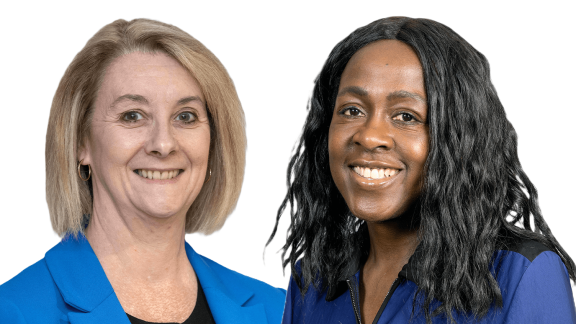Addressing health inequalities in Surrey through a BAME health alliance

A significant proportion of the health workforce in the Surrey Heartlands are from ethnic minority groups (this averages 23 per cent, with a range of 6 to 39 per cent).
Growing concern over the disproportionate impact of COVID-19 on these workers and their families, as well as the racial inequality of societies, led Surrey Heartlands ICS to create a system-wide BAME Alliance to tackle inequalities across the whole system for the benefit of its workforce and communities.
Key benefits and outcomes
- Improving inequality through the BAME Alliance has led to systemic changes for the workforce, with an additional positive impact on patient service delivery.
- Rapid risk assessments for ethnic minority staff meant those at increased risk and in patient-facing roles could be redeployed at an early stage in the pandemic.
- Collective working across workforce and communities has led to greater vaccine uptake across disproportionately affected communities, a reduction in the racism experienced, and a more equitable recruitment process.
What the organisation faced
Across Surrey, the health workforce had forged strong established links with around 25 VCFS (voluntary, community and faith sector) communities through the voluntary sector, who in turn are linked to around 50 other organisations. The extensive reach of these connections meant that when the COVID-19 pandemic hit, everyone knew someone who had been affected by the virus.
COVID-19’s devastating impact on so many staff, their families and the wider population, as well as racial inequalities highlighted by the murder of George Floyd, was the catalyst for Surrey Heartlands ICS’s decision to take rapid action to identify and address inequalities across both its workforce and in the wider communities.
What the organisation did
In April 2020 the ICS set up the BAME Alliance, which included NHS members across acute, primary care, community care, mental health and the ambulance service, as well as the local council’s public health department, members of the Surrey Minority Ethnic Forum and UNISON.
The BAME Alliance’s immediate concern was to rapidly support ethnic minority colleagues through the first wave of COVID-19. The alliance played a key role in establishing a risk assessment framework and support network to ensure all staff were offered a comprehensive risk assessment, with continued monitoring. This support was offered to community providers and staff working across primary care, as well as acute trusts.
The alliance also recognised the key role of the significant proportion of ethnic minority workers in care homes. As they were outside the NHS requirement to complete a risk assessment, the alliance worked collaboratively with the Care Homes Association, UNISON and Surrey County Council to produce a guidance document on risk assessment and wider COVID-19 challenges. This was distributed to over 600 care settings across Surrey.
Historic national Workforce Race Equality Standards (WRES) data also highlighted the racial discrimination that colleagues from ethnic minority backgrounds faced. The BAME Alliance started challenging other organisations to take action to address health inequalities linked to race by creating improved engagement and service provision for ethnic minority communities. A wider group now works collaboratively to ensure a collective voice is represented through the executive sponsor and system board.
A rapid needs assessment was also completed by the Public Health and Surrey Minority Ethnicity Forum to identify the challenges faced by communities in relation to COVID-19. One of the challenges identified was that those communities with the worst outcomes often had a high level of mistrust, with many refusing to engage with health services. This led to prompt action to step up and build trust and help engender confidence further along the line.
This approach can be seen in context of vaccine hesitancy. A common challenge in underserved and socially deprived communities was that people were reluctant to take time off work to get the vaccine, as they couldn’t afford to lose their wages. In response to this, GPs in Leatherhead forged links with local faith groups and would spend one evening a week vaccinating people in their local church. Another GP replicated this example at his local mosque, which led to 700 people being vaccinated there.
Additionally, mobile vaccination teams travelled across Surrey to meet other underserved traveller, Gypsy, Roma and asylum-seeker communities.
Other actions included socially distanced peer-to-peer drop-in sessions where staff could talk to each other in confidence about issues affecting them; making sure colleagues were aware how to access support (such as freedom to speak up guardians); and carrying out individual staff and team risk assessments to make sure everyone was working in as safe an environment as possible, and redeployed if necessary.
Results and benefits
The BAME Alliance and issues related to race equality is now firmly established on the agenda at the highest level in Surrey Heartlands. The effects of collectively working across workforce and communities to reduce racism and discrimination for people from a BAME background is starting to have an impact, with greater vaccine uptake across all these disproportionately affected communities, a reduction in the racism experienced, and a more equitable recruitment process.
Updates on the work and progress have been provided to the strategic oversight assurance group (SOAG) each month, with links into the people board, system board, and equalities and health inequalities, which ensures ongoing accountability.
Setting up the BAME Alliance has also enabled a rapid evaluation of the ICS’s WRES data to understand themes, patterns and trends. The resulting delivery of systemic changes for the workforce has had an additional positive impact on patient service delivery.
Developing this trust systemically and at all levels was vitally important and has naturally led to more meaningful health conversations across all communities. For example, health visitors talking to mums about dental care found it could easily lead to a conversation about improving their vaccine confidence. This was especially important for those mums who became pregnant again, especially when the national health advice changed from advising pregnant women not to have the vaccine, to having it.
Overcoming obstacles
The pandemic placed many additional pressures on a stretched workforce, which meant the representation and progression of actions was not at the pace initially hoped for.
The BAME Alliance addressed this by asking the SOAG to sign up to five commitments. Each CEO has made the commitment which has been followed up by a request for the CEOs to demonstrate the action they would take to realise those commitments. All the CEOs have returned a completed action set and this will be followed up at SOAG for assurance.
Takeaway tips
- Having executive leadership who are strategic and passionate for race equality - and not afraid to challenge the status quo - has been key.
- Linking the NHS and public health has been really beneficial, but having the Surrey Minority Ethic Forum to bridge all of the work back to the communities has been invaluable, for both listening to issues and also for building trust.
Further information
For further information on the work in this case study, please contact
Giselle Rothwell, director of communications and engagement at Surrey Heartlands Integrated Care System: giselle.rothwell@nhs.net
or
Yasmin Damree-Ralph, EDI lead: yasmin.damree-ralph@nhs.net



